Ride Up Grades: The road bike camp you wish you’d had as a kid
This article originally appeared on Velo News
"Ride Up Grades by Trek Summer Camp," is the only public free two-week intensive youth road cycling program on the East Coast.
There are other youth and/or road cycling programs in New York City, starting with Bike New York all the way up to New York Cycle Club's SIG and youth-only groups like New York Junior Cycling and NYCMTB.
But there is none quite like this one -- the aforementioned are all either school-based, cost money, aren't on modern road bikes (and certainly don't provide them), or aren't daily intensives.
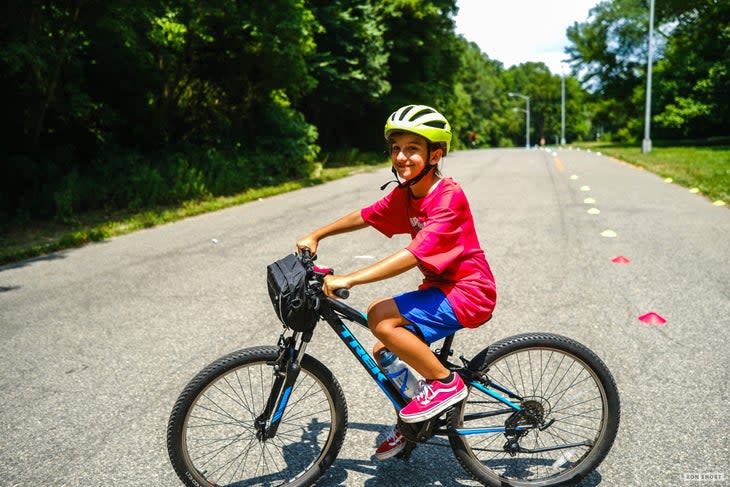
The plan is to introduce kids to road cycling with the aim of teaching safe commuting skills and building endurance. The ability to "go by bike" offers life-changing freedom to young people, and doing it on drop bar bikes creates a broader base of young riders with the ability to try road racing. It's part skills clinic, part "make cycling cool again" -- in that there's nothing cooler than independence.
For full transparency, Ride Up Grades is my project. I've taught youth cycling since 2016, and from my first day with Bike New York I saw the need for a road cycling summer camp.
In 2021, Ride Up Grades (which consists of me and personal trainer Teresa Fisher) launched the road cycling camp in partnership with Trek with funds from Outride, Ostroy, and generous individuals worldwide. We keep it going with help from Jason Marshall, the mechanic behind Seneca Village Bikes, who let us store unreasonable amounts of full bikes and bike parts in his home for over a year.
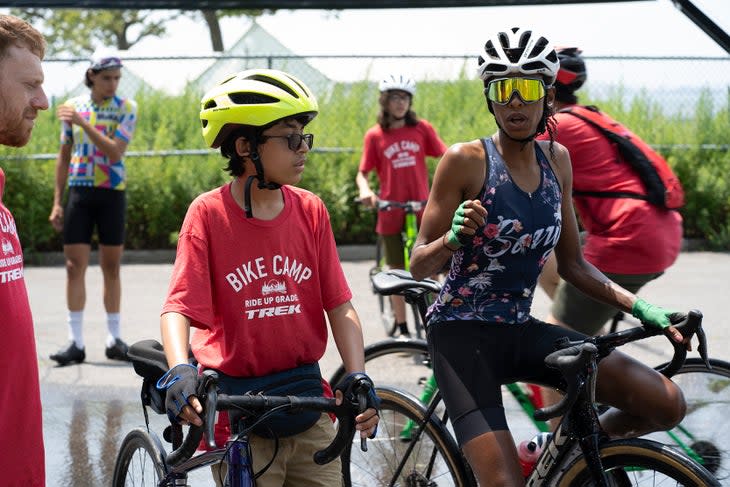
Every weekday, for two weeks in July, 20 teens and tweens gather at Trek Bicycles 96th Street on the upper west side of Manhattan before it opens. My counselors and I bring up Domanes for the kids from the basement of the shop: we have AL2s generously donated by Trek corporate, as well as the shop's very nice SL6 test bikes.
We fill everyone's bottles before loading the cooler into a Burley bike trailer along with what you'd expect for a bike camp - snacks, first aid, a pump, and tools. A Trek staffer on an e-bike will ferry our things around for the day.
Early days are spent in nearby parks working our way through a series of League of American Bicyclists drills and games. We begin with the "Power Start" to make sure riders can do the basics, and work our way up to drills on shifting.
To teach the group of kids ranging from age 11 to 19 to change gears - the SL6's run Ultegra while the AL2s run Claris - had them riding a circle up one hill in Riverside Park nonstop for over 90 minutes.
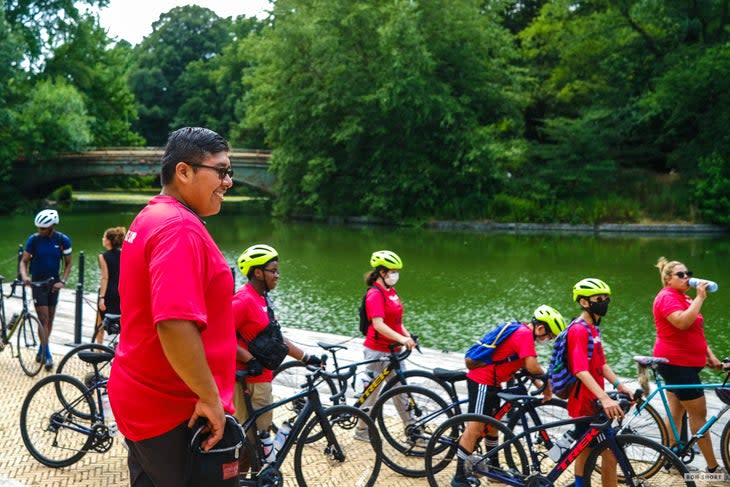
Next comes practice at dodging the potholes and pedestrians of city cycling. We teach riders to look over their shoulders for oncoming traffic before merging; then, it’s emergency stops and turns, as well as never to ride within arm's reach past a pedestrian or another rider. Also, to keep one bike length apart when they ride single file or when they're on their own riding behind strangers.
There’s a bit of ‘do as I say, not as I do:’ when you're older, you'll understand. On an enclosed rail trail our advanced riders get to practice drafting, but we focus mostly on skills the whole group is ready to learn, like spacing, pacing, and cornering.
A "mechanic, nutrition, and recovery day" is included each week, where we teach campers the basics about their machines: bicycle anatomy, how to change tires and reseat a chain, as well as the basics of how to eat for endurance activities, and how to stretch afterward. We generally end each day with a round of stretching and, in true camp fashion, "Circle Time" where we talk about what we liked (and didn't) about our last seven hours on the bike.
It's basically a full novice-level cycling training course for ‘brifter bikes.’ Sounds simple until you consider NYC 90-degree with 60 percent humidity days and busy New York streets. Most rides take us up and down the West Side Highway, which is a sun-exposed strip of protected bike path that runs the length of the west side of Manhattan.
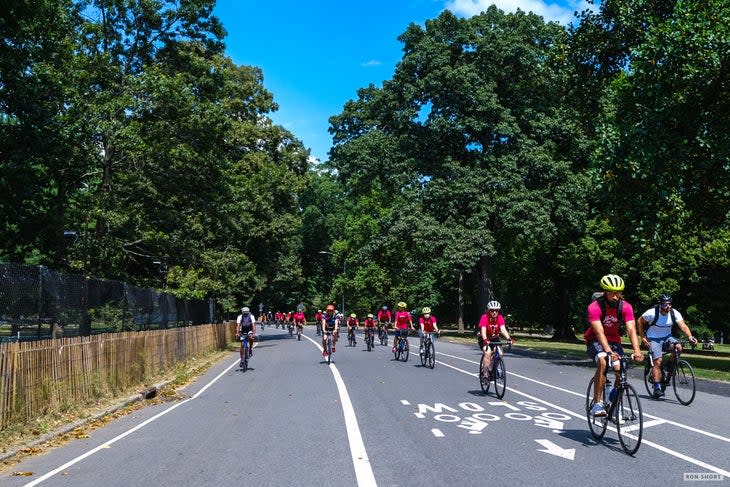
Like last year, we rode to Governors Island, Inwood Hill Park, Randall’s Island, and took the train out to Prospect and Van Cortlandt parks. We spent our last day riding through Pelham Bay Park. Altogether, we did a little over 150 miles, having had to cancel a day and a half due to rain, and not counting the drills (like the 90 minutes they spent on the hill).
These first two years Ride Up Grades by Trek Summer Bike Camp have been free, with one-quarter of campers coming from families that make less than $75,000 a year. For 2023 we will move to a sliding scale with the aim of expanding camp locations to areas where more residents live below the poverty line. I won't whip out my Uncle Sam costume and point aggressively at you from this article, but I will say: your local camp needs you. There's a list of United States youth cycling programs here, but it needs updating.
We complain that American road cycling needs a second renaissance. Hyper-locally - in New York City where I was born and raised - we complain that cycling is dangerous and expensive, and the community is difficult to join. If we want to see cycling get more attention or become more accepted, the secret is not in converting old people.
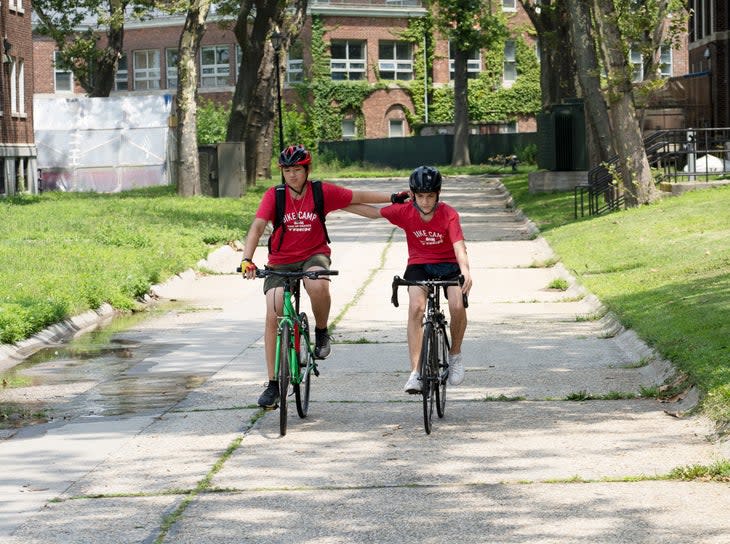
Rather, teaching young people to ride safely and introducing them to various cycling clubs and resources is a part of the route to a community - nay, a society - that likes bikes. We also support riders outside of camp sessions by providing bike and gear sponsorships in conjunction with Ostroy. If you want to get involved or ask about starting your own program, reach out to staff@rideupgrades.org.
For exclusive access to all of our fitness, gear, adventure, and travel stories, plus discounts on trips, events, and gear, sign up for Outside+ today.

